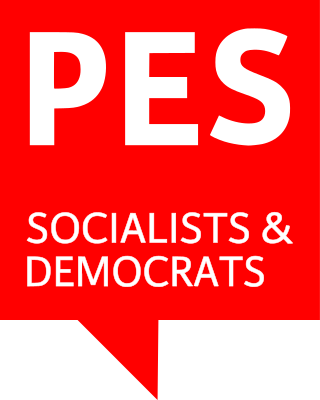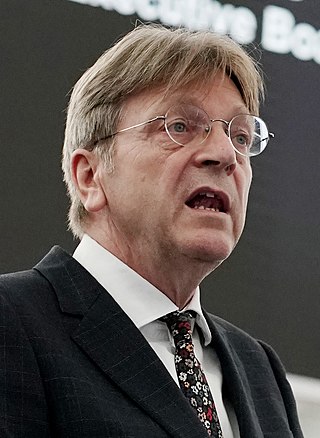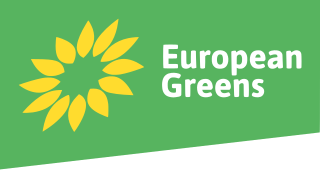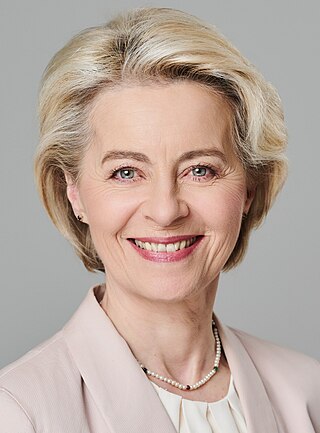
The Benelux Union or Benelux is a politico-economic union and formal international intergovernmental cooperation of three neighbouring states in Western Europe: Belgium, the Netherlands, and Luxembourg. The name is a blend word formed from joining the first few letters of each country's name and was first used to name the customs agreement that initiated the union. It is now used more generally to refer to the geographic, economic, and cultural grouping of the three countries.

The Council of the European Union, often referred to in the treaties and other official documents simply as the Council, and informally known as the Council of Ministers, is the third of the seven Institutions of the European Union (EU) as listed in the Treaty on European Union. It is one of two legislative bodies and together with the European Parliament serves to amend and approve or veto the proposals of the European Commission, which holds the right of initiative.

The European Council is a collegiate body that defines the overall political direction and priorities of the European Union. The European Council is part of the executive of the European Union (EU), beside the European Commission. It is composed of the heads of state or of government of the EU member states, the President of the European Council, and the President of the European Commission. The High Representative of the Union for Foreign Affairs and Security Policy also takes part in its meetings.

The European Commission (EC) is the primary executive arm of the European Union (EU). It operates as a cabinet government, with 27 members of the Commission headed by a President. It includes an administrative body of about 32,000 European civil servants. The commission is divided into departments known as Directorates-General (DGs) that can be likened to departments or ministries each headed by a Director-General who is responsible to a Commissioner.

The Party of European Socialists (PES) is a social democratic European political party.

The president of the European Commission is the head of the European Commission, the executive branch of the European Union (EU). The president of the commission leads a cabinet of commissioners, referred to as the college. The president is empowered to allocate portfolios among, reshuffle, or dismiss commissioners as necessary. The college directs the commission's civil service, sets the policy agenda and determines the legislative proposals it produces. The commission is the only body that can propose or draft bills to become EU laws.

Guy Maurice Marie Louise Verhofstadt is a Belgian liberal politician and an advocate of a Federal Europe. He is a former prime minister of Belgium. He has been a member of the European Parliament (MEP) from Belgium since 2009.

The presidency of the Council of the European Union is responsible for the functioning of the Council of the European Union, which is the co-legislator of the EU legislature alongside the European Parliament. It rotates among the member states of the EU every six months. The presidency is not an individual, but rather the position is held by a national government. It is sometimes incorrectly referred to as the "president of the European Union". The presidency's function is to chair meetings of the council, determine its agendas, set a work program and facilitate dialogue both at Council meetings and with other EU institutions. The presidency is currently, as of July 2024, held by Hungary.

The president of the European Council is the person presiding over and driving forward the work of the European Council on the world stage. This institution comprises the college of heads of state or government of EU member states as well as the president of the European Commission, and provides political direction to the European Union (EU).

The European Green Party (EGP), also referred to as European Greens, is a transnational, European political party representing national parties from across Europe who share Green values.

The president of the European Parliament presides over the debates and activities of the European Parliament. They also represent the Parliament within the European Union (EU) and internationally. The president's signature is required for laws initiated under co-decision and the EU budget.

The European Public Prosecutor's Office (EPPO) is an independent body of the European Union (EU) with juridical personality, established under the Treaty of Lisbon between 23 of the 27 states of the EU following the method of enhanced cooperation. The EPPO was established as a response to the need for a prosecutorial body to combat crimes affecting the financial interests of the European Union (EU). The idea of establishing the EPPO gained momentum with a legislative proposal put forth by the European Commission in 2013. After lengthy negotiations and discussions within the European Council, the European Parliament and Member States, Regulation (EU) 2017/1939 was adopted on October 12, 2017, formalizing the creation of the EPPO. The EPPO Regulation is the EPPO's legal basis, as it outlines the objectives, structure, jurisdiction, and operational procedures. Directive (EU) 2017/1371, also known as the PIF Directive, specifies the criminal offenses affecting the EU's financial interest falling under the EPPO's jurisdiction. The EPPO's primary mandate is to investigate and prosecute offenses such as fraud, corruption, and money laundering that harm the financial interests of the EU, as defined by the PIF Directive. The EPPO represents a significant step towards a more integrated and effective approach to combating transnational crimes within the EU, fostering collaboration and coordination among member states to protect the Union's financial resources. As an independent EU body, the EPPO plays a crucial role in ensuring the rule of law and safeguarding the integrity of the EU's financial system. The EPPO is based in Kirchberg, Luxembourg City alongside the Court of Justice of the European Union (CJEU) and the European Court of Auditors (ECA).

Eva Kaili is a Greek politician who served as a member of the European Parliament (MEP) from 2014 to 2024. She served as one of fourteen vice presidents of the European Parliament from January 2022 until she was arrested in December 2022 and charged with corruption as part of the Qatar corruption scandal at the European Parliament.

The European Union and Georgia have maintained relations since 1992, following an agreement between the former European Community and the newly independent Georgia. In 2006, a five-year "Action Plan" of rapprochement was implemented in the context of the European Neighbourhood Policy (ENP). In 2009, relations between the two were further upgraded under the auspices of Eastern Partnership. In 2016, a comprehensive Association Agreement between the EU and Georgia went into force, providing Georgian citizens with visa-free travel to the EU, as well as access to some sectors of the European Single Market. Following Brexit, most of the existing EU-Georgia agreements applicable to the United Kingdom were renegotiated and agreed upon in 2019 bilaterally with the United Kingdom.

Charles Michel is a Belgian politician serving as the president of the European Council since 2019. He previously served as the prime minister of Belgium between 2014 and 2019. Michel became the minister of development cooperation in 2007 at age thirty-one, and remained in this position until elected the leader of the Francophone liberal Reformist Movement (MR) in February 2011. He led MR to the 2014 federal election, where they emerged as the third-largest party in the Chamber of Representatives. After coalition negotiations, Michel was confirmed as Prime Minister of a MR-N-VA-OVLD-CD&V government. He was sworn in on 11 October 2014, becoming the youngest Belgian prime minister since Jean-Baptiste Nothomb in 1841.

There are nine recognised candidates for membership of the European Union: Albania, Bosnia and Herzegovina, Georgia, Moldova, Montenegro, North Macedonia, Serbia, Turkey, and Ukraine. Kosovo formally submitted its application for membership in 2022 and is considered a potential candidate by the European Union.

The 2014 European Parliament election was held in the European Union (EU) between 22 and 25 May 2014. It was the 8th parliamentary election since the first direct elections in 1979, and the first in which the European political parties fielded candidates for President of the Commission.
Events in the year 2015 in the European Union.
Events in the year 1993 in the European Union.

The 2024 European Parliament election was held in the European Union (EU) between 6 and 9 June 2024. It was the tenth parliamentary election since the first direct elections in 1979, and the first European Parliament election after Brexit. A total of 720 Members of the European Parliament (MEPs) were elected to represent more than 450 million people from 27 member states. This election also coincided with a number of other elections in some European Union member states.















